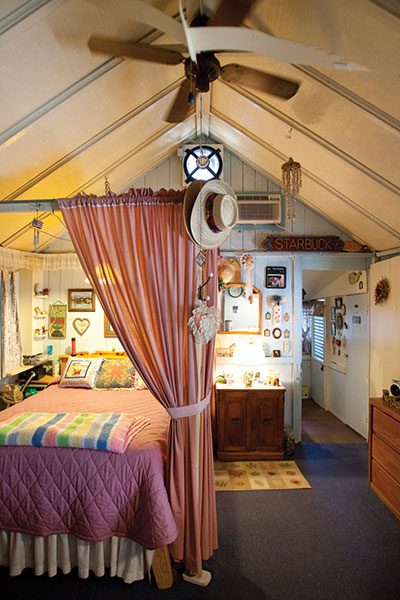
It was 30 years ago that Richard Le Duc got his first look at Ocean Grove’s tent colony. He was a warehouse supervisor at Schering-Plough, living in Clark at the time, and he and his wife had come down to the Monmouth County town for dinner with friends. The visit included a stop at the Great Auditorium.
“We went to the auditorium and got up on the balcony and looked down at all these tents,” recalls Le Duc, 81. “It looked like something out of Mary Poppins.”
The following year, Le Duc and his wife moved for the summer into Ocean Grove’s tent city. It is a unique place, a complex of 114 tents in which families spend the summer relaxing, participating in church activities, and reconnecting with neighbors they’ve seen year after year. The community is so intimate and the quarters so close together, people joke that when someone sneezes, all their neighbors say, “God bless you.”
“It’s so social. You’re sleeping outdoors,” says Winnie Walsh, 64, a Floridian who has spent the last twenty summers in an Ocean Grove tent. “At home, we don’t see anyone.”
Each of the tent homes is constructed on a wooden platform. The largest is about 13 feet by 18 feet, with a canvas section attached to a permanent wooden structure housing the kitchen and bathroom. In front of the canvas section, there is a narrow porch, often covered by an awning and sporting an American flag.
“I get the vacuuming done in three minutes,” Walsh says. “It takes two minutes to water the garden.”
The tents encircle the Great Auditorium—a 6,000-seat structure for religious services, dating back to 1894—creating a mini-city, with narrow streets for pedestrians only. The tents are largely used by seasonal congregants, some of whom are families with small children. Some have had tent leases in their families for four generations.
During the summer, the front porches are draped in petunias, impatiens, and ferns. At the end of the summer, the plants are taken down, the goldfish that were in the temporary ponds are given away, and the tents are closed up for the season, leaving just a platform, a wood storage shed for the furniture, and a couple of wooden poles out front.
The front room of the Le Ducs’ tent is decorated with little placards and framed embroidery with sayings like, “You are loved” and “All things bright and beautiful. All creatures great and small.” Eighteen mobiles hang from the ceiling.
When Le Duc and his wife first came to Ocean Grove, they wanted to get more involved in church. In Ocean Grove, he became an usher. She joined the ladies auxiliary. One of his daughters now has a tent nearby.
“We have a lot of roots here,” he says.
Founded in 1869 as a Methodist retreat, Ocean Grove over the years has attracted city dwellers from North Jersey and New York, who are drawn to the town’s charm and the gingerbread-encrusted Victorian homes that line the streets around the tent colony. The clock above the post office still chimes, the church bells play inspirational music, and ushers dress in blue blazers and white pants for Sunday services at the Great Auditorium.
Visitors are welcome to stroll and soak in the nineteenth-century ambience. The beach at Ocean Grove is open to the public (badges are required), and on-street parking is free. There is a boardwalk, but with few amenities—a stark contrast to Asbury Park, Ocean Grove’s neighbor to the north.
Ocean Grove—actually a section of Neptune Township—has always maintained its religious heritage. The Ocean Grove Camp Meeting Association of the United Methodist Church, still owns the land, and homebuyers receive a 99-year renewable lease on their property. Tent inhabitants do not have to be Methodist, but they do have to support the association’s spiritual missions.
At one time, the tents cost $75 to $100 for the season. Today, they run about $4,000 to $7,000, including water. Gas and electric bills are paid separately. Barbeques and open fires are prohibited, as are air conditioners, unless one has a doctor’s note.
Despite the rules, the waiting list for a tent is long—some say ten years.
“We can’t really measure it in time, but there are literally hundreds of people on the list, and we typically will only turn over one or two in any given season,” says Scott Hoffman, the association’s chief administrative officer.
The tent colony was started by people who would arrive in Ocean Grove, set up a tent, and stay for the camp meetings during the summer, Hoffman says. Over time, families began to stay longer, and permanent structures were erected.
“To keep the original flavor of the early days, the tents remained a part of the yearly meetings,” Hoffman says. “We have maintained the 114 that we currently have as a reminder of our beginnings.”



